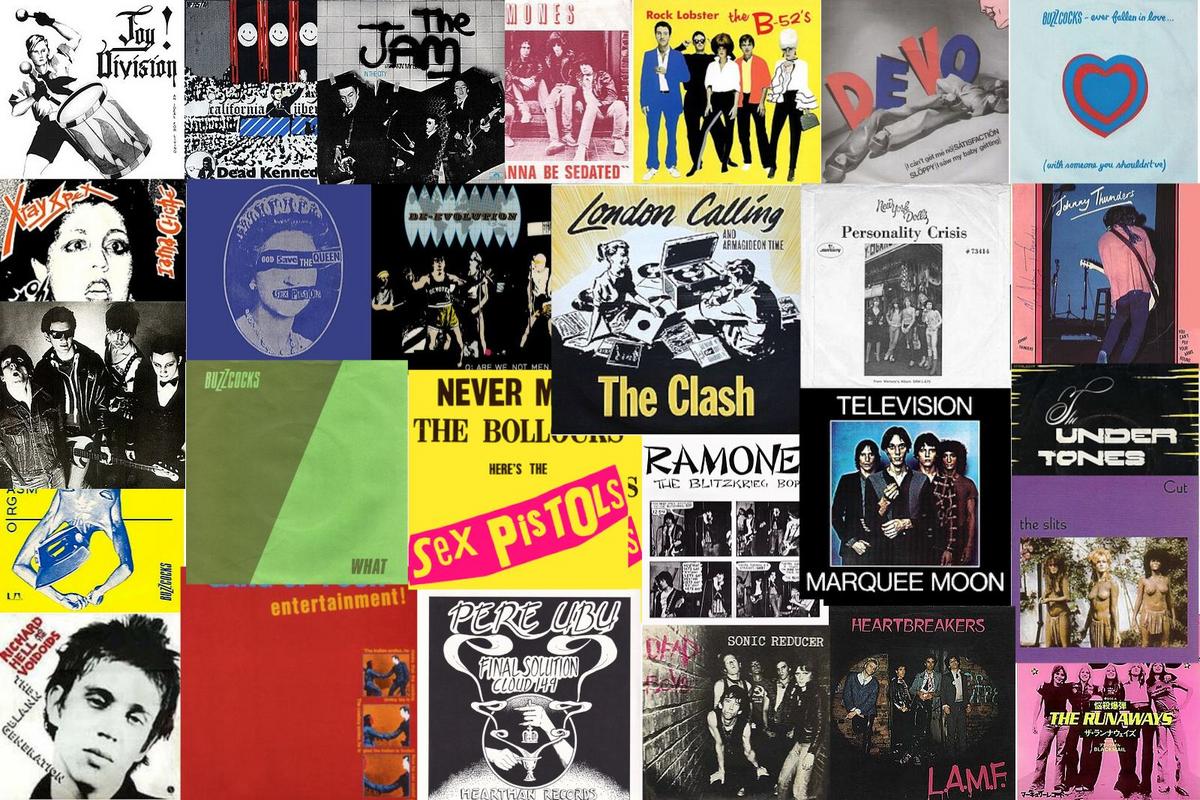Punk rock’s big bang happened sometime around 1973, when the self-titled debut album from the New York Dolls was released.
There were plenty of ripples before then — the Stooges, MC5, any number of garage rock bands turning the volume to 11 in the late ’60s — but for most purposes, punk rock as it’s defined today began in the mid-’70s.
Let the list below of the Top 30 Punk Rock Songs of the ’70s, selected by UCR’s staff, serve as an outline rather than a road map to the genre’s greatest period. Punk’s biggest names are here — the Clash, Ramones and Sex Pistols are well-represented — but so are the other architects of the sound of youthful rebellion that has been passed on through generations.
30. The Heartbreakers, “Chinese Rocks” (From L.A.M.F., 1977)
Soon after leaving the New York Dolls, guitarist Johnny Thunders and drummer Jerry Nolan formed the Heartbreakers with Television refugee Richard Hell. Their only album, 1977’s L.A.M.F., is a cornerstone of the New York City punk scene, with songs like “Chinese Rocks” — cowritten by Dee Dee Ramone, whose band later recorded a version — chronicling drug abuse, perpetual disappointment and failure.
29. Buzzcocks, “Ever Fallen in Love? (With Someone You Shouldn’t’ve?)” (From Love Bites, 1978)
Inspired by a line in the 1955 film version of Guys and Dolls starring Marlon Brando, “Ever Fallen in Love? (With Someone You Shouldn’t’ve?)” honed in on Buzzcocks’ punk-meets-pop seduction in less than three lively minutes. It became the band’s highest-charting single in their native U.K., just missing the Top 10. Pete Shelley finds the balance between pleading helplessness and tossed-off dismissal with aplomb.
28. X, “We’re Desperate” (From 1978 single)
X was one of the first bands in Los Angeles to be labeled punk, but they never fit squarely into that role. Their instincts leaned toward ’50s rock ‘n’ roll, with a guitarist and rhythm section that neared rockabilly. Producer Ray Manzarek, keyboardist for L.A. hippie torchbearers the Doors, also set them apart. Scene-surveying “We’re Desperate” was originally on the B-side of X’s first single and later rerecorded for 1981’s Wild Gift.
READ MORE: The Best Album by Punk’s 15 Biggest Artists
27. The Undertones, “Teenage Kicks” (From The Undertones, 1978)
Feargal Sharkey’s distinctive voice gave Ireland’s Undertones a leg up on their punk contemporaries, and they struck it big with their debut single. Lyrically, “Teenage Kicks” is little more than a boy-girl love song; it’s Sharkey’s jittery delivery of them, coupled with down-shifted guitars that give the track an edge. Legendary British DJ John Peel repeatedly called “Teenage Kicks” his favorite song. It’s easy to hear why.
26. Buzzcocks, “What Do I Get?” (From 1978 single)
Pete Shelley was asking questions at the start of his career, firing off “Whatever Happened To … ?,” “What Do I Get?” and the double hitter “Ever Fallen in Love? (With Someone You Shouldn’t’ve?)” within Buzzcocks’ first year. Their second single, “What Do I Get?,” was the first to chart in England, showcasing Shelley’s knack for catchy, hook-filled songs that never shied away from their commercial ambitions.
25. Joy Division, “Warsaw” (From An Ideal for Living, 1978)
Titled after Joy Division‘s early name for their band, “Warsaw” was earmarked for a debut album, also named Warsaw, before the LP was shelved. Featured on the group’s first EP, An Ideal for Living, “Warsaw” incorporates references to Nazi Germany, including a song-starting “3 5 0 1 2 5 go!” countdown that cites Rudolf Hess’ prisoner-of-war serial number. Blueprints were set for the band’s post-punk gloom.
24. The Heartbreakers, “Born to Lose” (From L.A.M.F., 1977)
Originally saddled with a muddy, barely listenable mix, the Heartbreakers’ only album has been the center of discussion for decades. One thing is clear: The songs are almost uniformly great, anchored in mid-’70s power pop and on-the-horizon punk rock. Johnny Thunders and Jerry Nolan cut their teeth in punk pioneers New York Dolls, so the sentiments are genuine. That energy blazes through the opening cut “Born to Lose.”
23. Pere Ubu, “Final Solution” (From 1976 single)
Cleveland’s Pere Ubu represented the avant-garde corner of punk music in the ’70s, combining early industrial touches along with frequently demanding art-rock. Bandleader David Thomas bristled at his band being labeled punk rock, but their abrasive, nonconforming music consistently avoided the mainstream. “Final Solution,” their second single, centers on the group’s landmark approach to harmony and sound.
22. Johnny Thunders, “You Can’t Put Your Arms Around a Memory” (From So Alone, 1978)
The Heartbreakers were still a band when Johnny Thunders, once again growing restless within the confines of a steady group, released his first solo album in 1978. So Alone features covers of the surf instrumental “Pipeline” and, as a nod to his past, New York Dolls’ “Subway Train.” The LP highlight “You Can’t Put Your Arms Around a Memory” is so relatable that both Guns N’ Roses and Ronnie Spector covered it.
21. The Slits, “Typical Girls” (From Cut, 1979)
The revolution sparked by these three women from London was barely a flicker in late 1979 when they released their debut album. Decades later, the Slits and the music on Cut now sound like an offspring of punk and the culmination of its evolution. Combining reggae, dub, art rock and tribal punk, the nearly four-minute “Typical Girls” busts out of the genre’s set boundaries, finding freedom in the new rules it forges.
20. Dead Boys, “Sonic Reducer” (From Young Loud and Snotty, 1977)
“Sonic Reducer” began life when Dead Boys guitarist Cheetah Chrome was in Rocket From the Tombs, the band that evolved into Pere Ubu. Along with Ubu’s David Thomas, Chrome wrote a punk-rock standard that rivaled much of what was coming from New York and London at the time. Cleveland’s Dead Boys released only two albums before dissolving at the dawn of the ’80s; “Sonic Reducer” is their much-covered masterpiece.
19. The B-52’s, “Rock Lobster” (From The B-52’s, 1978)
Like fellow American oddballs Devo, the B-52’s diverted the template of what punk music was supposed to sound like. Incorporating bargain-basement keyboards, a coed lineup and a penchant for ’60s kitsch style, the Athens, Georgia, quintet looked and sounded like nobody else. Their signature tune, “Rock Lobster,” celebrated a dance craze that never was and stirred the colorful new shades that led to new wave.
READ MORE: Who Are the ‘Big 4’ of Punk Rock?
18. Devo, “(I Can’t Get No) Satisfaction” (From Q: Are We Not Men? A: We Are Devo!, 1978)
The audacity with which Devo covered the uncoverable “(I Can’t Get No) Satisfaction” wasn’t so much a warning to 1960s rock fans as it was a full-on assault to one of their Mount Rushmores. Twisted by Devo’s hands into an unrecognizable tangle of wires, electronics and skittering vocals, the Rolling Stones cover embodied the anything-goes spirit of punk’s golden years. The field was suddenly blown wide open.
17. Devo, “Mongoloid” (From Q: Are We Not Men? A: We Are Devo!, 1978)
Originally released as Devo’s first single in 1977, “Mongoloid” was rerecorded and included on their debut album, Q: Are We Not Men? A: We Are Devo!, the next year. The Devo playbook arrived nearly complete: unsettling synths, the mocking vocals and the sense that everything is on the verge of total collapse flutter throughout “Mongoloid.” It all starts here for punk’s rules-breaking, daring next wave.
16. Gang of Four, “Natural’s Not in It” (From Entertainment!, 1979)
By 1979, punk music had developed into factions. Leeds quartet Gang of Four meshed their art-punk with outside influences, emphasizing a malleable rhythm section that leaned more toward funk than their guitar-slicing peers. Their debut album, Entertainment!, takes on hollow consumerism and fragile love. “We all have good intentions, but all with strings attached,” they sing on highlight “Natural’s Not in It.”
15. Richard Hell & the Voidoids, “Blank Generation” (From Another World, 1976)
Before forming the Voidoids, Richard Hell had served time in both Television and the Heartbreakers, significant parts of the New York City punk scene in the mid-1970s. As the decade crawled toward its end, he was ready to place his name out front. Hell had developed “Blank Generation” with his earlier bands before recording it with his new group on a 1976 EP. It became the centerpiece title track of their 1977 debut LP.
14. X-Ray Spex, “Oh Bondage Up Yours!” (From 1977 single)
A 1976 Sex Pistols concert inspired Poly Styrene to form X-Ray Spex and write their debut single, “Oh Bondage Up Yours!,” a landmark record in the burgeoning punk movement. Incorporating saxophone (not exactly a punk musician’s instrument of choice) and boasting one of the fiercest vocal performances in arguably punk’s greatest year, the song became both a rallying cry and a milestone moment of the scene.
13. Buzzcocks, “Orgasm Addict” (From 1977 single)
Buzzcocks announced themselves in true punk fashion with their debut single, “Orgasm Addict,” which was promptly banned by the BBC for its sexual lyrics: “You still keep beating your meat to pulp,” snarls Pete Shelley over a stuttering, jerky rhythm that barely lasts two minutes. Packaged in a sleeve featuring a semi-disguised naked woman, “Orgasm Addict” was designed to stir controversy. Mission accomplished.
12. The Jam, “In the City” (From In the City, 1977)
Unlike his contemporaries, Jam ringleader Paul Weller didn’t bother to hide his love for the Kinks, the Who and ’60s mod culture; he covered them, praised them and borrowed from them with frequent passion. The Jam’s debut single is a celebration of British youth that spans generations. “In the City” is also a pivotal song in the year punk broke, a firestorm of guitar riffing that connects eras, an heir to Pete Townshend‘s throne.
11. Dead Kennedys, “California Uber Alles” (From 1979 single)
Dead Kennedys’ debut single was released during Jerry Brown’s term as California’s governor from 1975 to 1983 and criticized the state’s slow recovery following Ronald Reagan’s tenure, comparing it to Nazi Germany. Though the left-leaning Brown aligned with singer Jello Biafra, few were spared in Biafra’s disdain for politicians. “California Uber Alles” was rerecorded for their 1980 debut LP, Fresh Fruit for Rotting Vegetables.
10. Television, “Marquee Moon” (From Marquee Moon, 1977)
Television was lumped into New York City’s punk scene almost by default, an association with acts that on the surface seemed more revolutionary than the guitar-based quartet. But the real revolution was happening inside the eight songs on their 1977 debut, Marquee Moon. Guitarists Tom Verlaine and Richard Lloyd were attracted to the era’s FM rock guitar interplay, no more evident than in the 10-minute title track.
9. Television, “See No Evil” (From Marquee Moon, 1977)
If most punk artists saw their purpose as breaking from the rock music standards it had adhered to since the mid-’50s, Television viewed it somewhat differently. Adapting punk’s young, snotty attitude to the tradition of drums, bass and loud guitars, the group linked the past, present and future in its music. Marquee Moon‘s opening song, “See No Evil,” sounds the alarm. Tom Verlaine is shaky and confident all at once.
READ MORE: The Clash Albums Ranked
8. The Damned, “New Rose” (From Damned Damned Damned, 1977)
When pop music artists began making album-length statements in the latter part of the ’60s, the course had changed from the market’s longstanding emphasis on the single. Punk music staged a return to the single as an artist’s format of choice. Great punk albums came from the scene, no doubt; many more great singles, however, emerged, too. The Damned’s “New Rose” was one of the first and still one of the best.
7. The Runaways, “Cherry Bomb” (From The Runaways, 1976)
Producer and impresario Kim Fowley gathered the Runaways as a female version of the strutting, male-dominated hard-rock that was all over the radio at the time. He wrote “Cherry Bomb” with guitarist Joan Jett in a burst of inspiration so the singer the band was auditioning would have something to show off her voice. The result was the Runaways’ debut single, a firecracker of punk liberation in 140 volcanic seconds.
6. Sex Pistols, “God Save the Queen” (From Never Mind the Bollocks, Here’s the Sex Pistols, 1977)
Timed for release during the 25th anniversary celebration of Queen Elizabeth’s coronation, the Sex Pistols’ second single was immediately met with scorn by the BBC, who refused to play it, and a good deal of the British public. But “God Save the Queen” was more than an anthem of dissent for the rising punk nation; it was validation that disengaged youth weren’t alone in their contempt for stodgy tradition.
5. Ramones, “I Wanna Be Sedated” (From Road to Ruin, 1978)
Joey and Dee Dee Ramone came up with the lyrics to “I Wanna Be Sedated” — “Nothing to do, nowhere to go” — while stranded in a shut-down London during the holidays after a tour. As the Side Two opener on their fourth album, Road to Ruin, the song perfectly summed up the Ramones’ frantic pace in 1978: four LPs in less than two and a half years. It was their last classic. Next up: a change of course with Phil Spector.
4. Ramones, “Blitzkrieg Bop” (From Ramones, 1976)
The opening blast of “Blitzkrieg Bop” hits like a proverbial ton of bricks: the fist-pumping “Hey, ho! Let’s go!” intro, the blazing guitar, the sheer simplicity of it all. And just like that, in a little more than two minutes, it’s over, disappeared into the air like a brief but life-altering moment that comes along only a few times in a lifetime. “Blitzkrieg Bop,” the opening cut on the Ramones’ self-titled debut, still sounds like an invitation to the future.
3. New York Dolls, “Personality Crisis” (From New York Dolls, 1973)
Did punk rock start with the New York Dolls? There’s a solid argument to be made. Either way, the band’s debut album wrapped in years of influences — from ’60s girl groups to ’70s glam, garage rock to bubblegum — and then lavished it all in a coating of gritty posturing. As the opening song on that first album, “Personality Crisis” can barely contain itself, springing outward with a volatile force rarely heard in music before.
2. Sex Pistols, “Anarchy in the U.K.” (From Never Mind the Bollocks, Here’s the Sex Pistols, 1977)
The shot heard around the world. Other songs lay claim to igniting the punk powder keg; other songs certainly got their first. But as far as impact and the paving of groundwork that set in motion an entire genre of music, the Sex Pistols’ “Anarchy in the U.K.” is right up there with the very best. First released in late 1976 as a single and later as the linchpin on their only LP, this is the sound of chaos rallying the troops.
1. The Clash, “London Calling” (From London Calling, 1979)
The Clash had already begun to shed their classical punk roots by 1978’s Give ‘Em Enough Rope, but it’s their third LP where they both refined and transcended the genre. A double-album extravaganza of rock music history, London Calling journeyed through the paths of popular music during the latter half of the 20th century; rockabilly, ska and jazz here, pop, new wave and, yes, punk there, no album in the band’s or, for that matter, the entire punk catalog swings quite like it. The album’s opening salvo, title track and statement of purpose rocks more determinedly than anything else released in the last year of the ’70s. “Phony Beatlemania has bitten the dust,” Joe Strummer sings over summoning siren calls. A new age was just beginning.
Punk Rock’s 40 Best Albums
From the Ramones to Green Day, this is musical aggression at its finest.
Gallery Credit: Michael Gallucci



